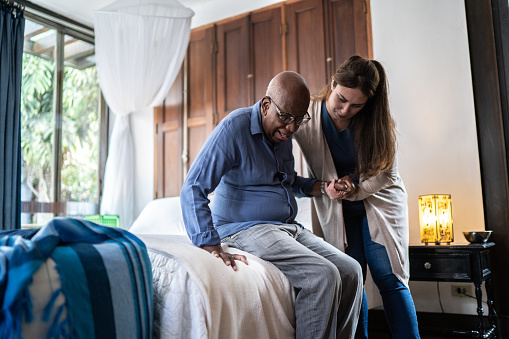Caregiver Support
Services

Caregiver Support
RESPITE CARE
What is Respite?
In a nutshell, respite means having someone else look after your loved one while you take a break. Respite can be:
- going to an exercise class
- having coffee with a friend
- attending your other child’s school program
- going on a date with your spouse
Respite is not the same as hospice. Hospice is a service for people who have a terminal illness and who have less than 6 months to live.
Need a break?
Caregiving places a high demand on family members or other regular caregivers, even when the care is eagerly and lovingly provided.
5 Signs of Caregiver Burnout:
- You feel furious one minute, sad and helpless the next. The despairing mix of physical and emotional exhaustion strikes many caregivers at one time or another.
- You catch every bug that comes your way. Stress doesn’t just make you anxious and depressed. It takes a toll on your immune system.
- You’re snapping at everyone. When you feel helpless and overwhelmed, you’re more likely to overreact to the things people do, or don’t do.
- You can’t remember the last time you met a friend for dinner or a movie. Everyone needs a break from time to time, so why don’t you give yourself one?
- You’re the go-to caregiver. Always. This may be the hardest job you’ll ever have, but try going it alone and you’ll quickly hit bottom.
When you’re caring for a loved one, it’s easy to forget about your own needs, putting you at serious risk of burnout. East Texas ADRC offers a variety of Lifespan Respite services including resources, information, training, referrals and relief options.
Caregivers Deserve a Break
We all have many roles — mother, father, son, daughter, brother, sister, friend. But one of the most important is caring for a loved one who is older or who has a disability. We call these people “caregivers.”
Caring for another person is hard work. And all caregivers deserve a break, which also is called respite.
Taking time for yourself is not selfish — it is necessary so you can keep being the best caregiver you can be.
Sometimes it’s hard to find someone or even trust them to take over for a few hours while you take a break; Take Time Texas can help. We maintain a searchable list of respite providers across the state.
Start now to find someone who will care for your loved one while you rest, recharge or take care of other necessary tasks.
While Texas Health and Human Services ensures qualified people get the services they need, there are some people who don’t qualify for our services because of their income or resources. These people are often cared for by their families and friends.
There are an estimated 3.4 million family caregivers in Texas who provide day-to-day care for people who are older or who have disabilities.
A Profile of Informal Caregiving in Texas (PDF) discovered the following about caregivers of older adults:
- 75 percent are Caucasian or Hispanic
- The majority are the child or spouse of the person they care for
- 90 percent live within 10 miles of the person they care for
- 95 percent provide care at least once a week
- More than half are not employed
- They are likely to be between the ages of 40 and 64
- They are more likely to be female
Research also has discovered some other facts about family caregivers: Those who don’t take time for themselves have been found to develop chronic health problems at nearly twice the rate of non-caregivers. And as many as 70 percent of family caregivers experience depression or anxiety.
HHS values the contributions of family caregivers and has developed programs to help them overcome some of the challenges they face.
Take Time Texas Respite Care
HHS recognizes that caring for another person is hard work and that caregivers sometimes need a break to refresh and recharge themselves. This break is also called respite. The Take Time Texas site has several resources to help caregivers, including:
- A search function that finds respite programs in Texas
- Testimonials from families who use respite
- Resources for new family caregivers
- Common myths about respite
Who Do You Take Care Of?
Family caregivers have many things in common. They love their family and want to see they get the best care possible. But every caregiver’s situation is unique. Caring for a child with a disability is different than caring for an aging parent. Even the type of respite services they need may vary.
I am a Caregiver of a Child
Most parents would agree that the early years with kids are some of the most challenging. But soon enough the kids are walking and talking, starting school, and then going off to college. With each step the child takes toward independence, parents reclaim a little of their freedom.
But for parents of a child with a disability or special health care needs, independence looks very different and does not have such a predictable timetable.
Many parents of special needs children are prepared to give everything to keep their child comfortably at home. However, that same devotion can cause:
- caregivers to neglect their own health,
- friction within families, and
- extra stress at work or school.
That’s why when you have a child with special needs, it is important to develop a plan so that you can have time away from the demands of parenting.
I am a Caregiver of an Adult
Many families don’t see caring for an aging spouse or parent as a burden; rather it is just what you do for people as they get older.
A Profile of Informal Caregiving in Texas (PDF) discovered the following about caregivers of older adults:
- 75% are Caucasian or Hispanic
- The majority are the child or spouse of the person they care for
- 90% live within 10 miles of the person they care for
- 95% provide care at least once a week
- More than half are not employed
- They are likely to be between ages 40 and 64
- They are more likely to be female
Caregivers who don’t take some time for themselves have been found to develop chronic health problems at nearly twice the rate of non-caregivers. And as many as 70% of family caregivers experience depression and anxiety.
If you don’t take care of yourself, who is going to be the caregiver for your loved one?
Caregiver 101
Becoming a caregiver for a loved one comes with a new set of responsibilities, some of which may seem unfamiliar or intimidating. But unlike many other challenges in life, you are likely taking on these new responsibilities based on your love for your family.
Helpguide.org offers these tips to help new caregivers get started on their journey:
- Learn as much as you can about your family member’s illness or disability and about how to be a caregiver. The more you know, the less anxiety you’ll feel about your new role and the more effective you’ll be.
- Seek out other caregivers. It helps to know you’re not alone. It’s comforting to give and receive support from others who understand what you’re going through.
- Trust your instincts. Remember, you know your family member best. Don’t ignore what doctors and specialists tell you, but listen to your gut, too.
- Encourage your loved one’s independence. Caregiving does not mean doing everything for your loved one. Be open to technologies and strategies that allow your family member to be as independent as possible.
- Know your limits. Be realistic about how much of your time and yourself you can give. Set clear limits, and communicate those limits to doctors, family members, and other people involved.
Can My Family Provide Respite?
Sometimes, a family member or friend can step in and watch your child when you need a break. Other times, you may have to find a professional respite provider. Some government programs — such as those funded by Medicaid or the state of Texas — may include respite services.
The person who cares for your child should really know about what is right for you and your child.
Where Is Respite Provided?
Where you get respite depends on family preferences, available services, and other factors. The most important thing is that you find what is right for your family and that you, as caregiver, get a break.
Finding and training a reliable respite caregiver is a precious thing! A few moments alone with a spouse or sibling is treasured when I know my child is safe and taken care of.
Respite can be provided in many places:
- In your home
- The home of a family or friend
- At a specialized camp
- At a specialized facility (for extended care)
How do I Find a Respite Provider?
Please visit our searchable list of respite providers and programs in Texas. It includes all types of providers and you can search it based on the type of service you need and where you live.
If you are looking for more informal arrangements, you might consider asking family or friends for help, putting a notice up at your church, placing an ad in the paper or forming a caregiver cooperative. More ideas can be found in Get Creative About Respite Care: A Parent’s Guide (PDF), from the Connecticut Lifespan Respite Coalition.
When you think that you or someone you know needs a break in order to continue providing quality care for another, East Texas Aging and Disability Resource Center is your best place to find out what options are available for respite in your area.
The East Texas ADRC has information and contacts to help you find the service that’s right for you and the one you care for.
Let East Texas ADRC help you find the resources, information, training referrals and relief options you need to keep you, and those counting on you, going strong!
How To Contact Us
We understand that finding help for older adults and people with disabilities can be overwhelming. That’s why we have Trained Specialists who will guide you to the right service options to help meet your needs. They are available to assist you Monday – Friday, 8 a.m. – 5 p.m. If you live within the 23 counties we serve, call the number below and follow the instructions.
Dial 1-855-937-2372
- then Press 1
- Press 1 again
- Enter the ZIP Code of the person receiving care or assistance
After following these easy steps, your call will be transferred to our Trained Information and Referral Specialists who are ready to listen to your concerns and provide you with information for a variety of service providers, including publicly funded and private pay services.
Whether you are looking for long-term care services or supports for yourself or someone else, please give the ADRC number a call.


